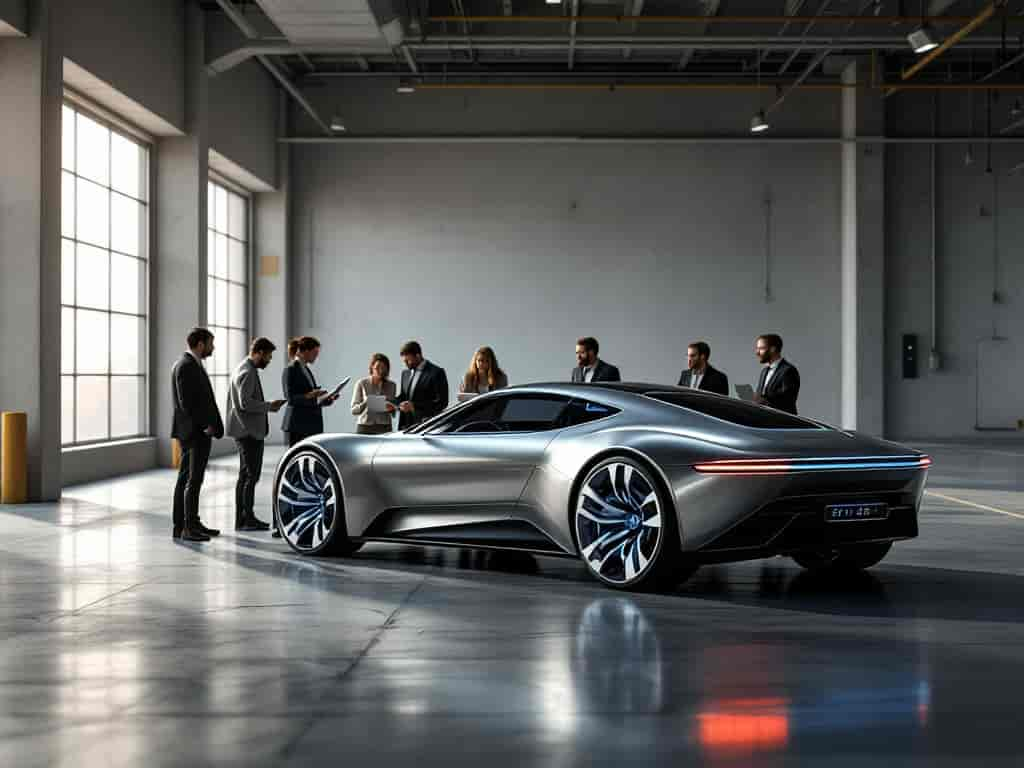Hydrogen Fuel Cell Cars: The Next Big Thing?
Ellie Moore

Photo: Hydrogen Fuel Cell Cars: The Next Big Thing?
Hydrogen Fuel Cell Cars: The Next Big Thing?
As the world accelerates towards sustainable transportation, hydrogen fuel cell cars are emerging as a promising contender alongside electric vehicles. But are hydrogen fuel cell cars truly the next big thing in the automotive industry? This comprehensive exploration delves into the technology, benefits, challenges, and future prospects of hydrogen fuel cell cars, providing you with actionable insights and a clear understanding of their potential role in our transportation ecosystem.
What Are Hydrogen Fuel Cell Cars?
Hydrogen fuel cell cars are vehicles that generate electricity through a chemical reaction between hydrogen and oxygen, producing only water vapor as a byproduct. Unlike traditional internal combustion engines or even battery-electric vehicles, hydrogen fuel cells offer a unique approach to powering automobiles, combining the benefits of clean energy with impressive performance metrics.
How Do Hydrogen Fuel Cells Work?
Understanding the mechanics of hydrogen fuel cells is crucial to appreciating their potential. Here's a simplified breakdown:
- Hydrogen Storage: Hydrogen gas is stored in high-pressure tanks within the vehicle.
- Fuel Cell Stack: The stored hydrogen is fed into the fuel cell stack, where it reacts with oxygen from the air.
- Electricity Generation: This chemical reaction generates electricity, which powers the vehicle's electric motor.
- Water Emission: The only byproduct of this process is water vapor, making it an environmentally friendly solution.
Advantages of Hydrogen Fuel Cell Cars
Hydrogen fuel cell cars offer several compelling benefits that position them as a viable alternative to conventional and electric vehicles.
1. Environmental Benefits
- Zero Emissions: The primary advantage is that hydrogen fuel cell cars emit only water vapor, significantly reducing greenhouse gas emissions.
- Sustainable Energy Source: Hydrogen can be produced from various renewable sources, enhancing the sustainability of these vehicles.
2. Efficiency and Performance
- High Efficiency: Fuel cells are more efficient than traditional combustion engines, providing better mileage per kilogram of hydrogen.
- Quick Refueling: Unlike electric vehicles that require lengthy charging times, hydrogen cars can be refueled in under five minutes, similar to gasoline cars.
3. Energy Security
- Diverse Supply: Hydrogen can be produced locally from abundant resources, reducing dependence on fossil fuels and enhancing energy security.
4. Lightweight Design
- Reduced Weight: Fuel cell systems are generally lighter than large battery packs required for electric vehicles, contributing to better vehicle performance and handling.
Challenges Facing Hydrogen Fuel Cell Cars
Despite their advantages, hydrogen fuel cell cars face several significant challenges that need to be addressed for widespread adoption.
1. Infrastructure Development
- Limited Refueling Stations: One of the primary hurdles is the scarcity of hydrogen refueling infrastructure, especially outside major urban centers.
- High Initial Investment: Building a comprehensive hydrogen infrastructure requires substantial investment, which can be a deterrent for stakeholders.
2. Cost Factors
- High Production Costs: Manufacturing fuel cells and hydrogen storage systems remains expensive, making hydrogen cars pricier than their electric or gasoline counterparts.
- Economies of Scale: Currently, limited production scales prevent cost reductions that could make hydrogen cars more affordable.
3. Hydrogen Production and Storage
- Energy-Intensive Production: Producing hydrogen, especially green hydrogen from renewable sources, is energy-intensive and costly.
- Storage Challenges: Hydrogen has a low energy density by volume, necessitating high-pressure tanks or cryogenic storage solutions, which add to the vehicle's weight and cost.
Current State of Hydrogen Fuel Cell Cars
Hydrogen fuel cell technology has made notable strides, with several automakers introducing models and investing in research and development.
Key Players in the Market
- Toyota Mirai: One of the most recognized hydrogen fuel cell cars, the Mirai offers impressive range and quick refueling times.
- Honda Clarity Fuel Cell: Another prominent model, the Clarity emphasizes comfort and efficiency.
- Hyundai Nexo: Hyundai’s entry into the market showcases advanced fuel cell technology with a focus on practicality and sustainability.
Real-Life Examples and Case Studies
- California’s Hydrogen Initiatives: California leads the U.S. in hydrogen infrastructure, supporting a network of refueling stations that facilitate the use of hydrogen cars.
- European Investments: Countries like Germany and Japan are investing heavily in hydrogen technology, aiming to integrate it into their national transportation strategies.
Future Outlook: Are Hydrogen Cars the Next Big Thing?
The future of hydrogen fuel cell cars hinges on overcoming existing challenges and capitalizing on their unique advantages. Here's what the future may hold:
Technological Advancements
- Improved Fuel Cell Efficiency: Ongoing research aims to enhance the efficiency and durability of fuel cells, making them more competitive.
- Green Hydrogen Production: Advances in renewable energy sources could lower the cost and environmental impact of hydrogen production.
Infrastructure Expansion
- Government Support: Increased government incentives and investments could accelerate the development of hydrogen refueling stations.
- Public-Private Partnerships: Collaborations between governments and private companies can drive infrastructure growth and innovation.
Market Trends
- Increased Consumer Awareness: As consumers become more environmentally conscious, the demand for sustainable transportation options like hydrogen fuel cell cars may rise.
- Competitive Landscape: The entry of more automakers into the hydrogen market can lead to competitive pricing and better technologies.
Practical Tips for Adopting Hydrogen Cars
If you're considering switching to a hydrogen fuel cell car, here are some practical steps to guide your decision:
1. Assess Your Location
- Refueling Infrastructure: Ensure that there are adequate hydrogen refueling stations in your area or along your regular routes.
- Government Incentives: Check for any local or national incentives that support the purchase of hydrogen vehicles.
2. Evaluate Your Driving Needs
- Range Requirements: Hydrogen cars typically offer a range comparable to gasoline vehicles, making them suitable for long-distance travel.
- Usage Patterns: Consider whether the quick refueling time aligns with your daily schedule and driving habits.
3. Research Available Models
- Compare Features: Look into different models to find one that best fits your needs in terms of size, performance, and technology.
- Test Drives: Experience driving a hydrogen fuel cell car to understand its performance and comfort firsthand.
4. Consider Total Cost of Ownership
- Initial Investment: While hydrogen cars may have a higher upfront cost, consider long-term savings on fuel and maintenance.
- Resale Value: Evaluate the potential resale value as the market for hydrogen vehicles grows.
Conclusion
Hydrogen fuel cell cars represent a promising avenue towards sustainable and efficient transportation. While they face challenges related to infrastructure, cost, and hydrogen production, ongoing advancements and increasing investments are paving the way for their broader adoption. As technology evolves and the market matures, hydrogen fuel cell cars could indeed become the next big thing in the automotive industry, offering a clean and efficient alternative to both traditional and electric vehicles.
Ready to explore more about the future of transportation? Share your thoughts in the comments below, share this article with fellow enthusiasts, and stay tuned for more insights on cutting-edge automotive technologies!
Frequently Asked Questions (FAQ)
1. How do hydrogen fuel cell cars compare to electric vehicles in terms of environmental impact?
Hydrogen fuel cell cars emit only water vapor, making them zero-emission vehicles similar to electric cars. However, the overall environmental impact depends on how the hydrogen is produced. Green hydrogen, produced using renewable energy, offers a more sustainable solution compared to hydrogen derived from fossil fuels.
2. Are hydrogen fuel cell cars more expensive than traditional gasoline cars?
Currently, hydrogen fuel cell cars tend to be more expensive than traditional gasoline vehicles due to higher production costs of fuel cells and hydrogen storage systems. However, as technology advances and production scales up, costs are expected to decrease, making them more competitive.
3. How long does it take to refuel a hydrogen car?
Refueling a hydrogen fuel cell car typically takes about 3-5 minutes, which is comparable to refueling a gasoline vehicle and significantly faster than charging an electric vehicle.
4. Is the hydrogen infrastructure expanding globally?
Yes, hydrogen infrastructure is expanding, particularly in regions like California, Europe, and Japan. Governments and private companies are investing in building more hydrogen refueling stations to support the growing number of hydrogen fuel cell vehicles.
5. What is the lifespan of a hydrogen fuel cell?
Fuel cells in hydrogen cars are designed to last between 5 to 10 years, depending on usage and maintenance. Advances in technology are continually improving the durability and lifespan of fuel cell systems.
Finance & Investment
View All
November 12, 2024
Market Orders 101: Executing Trades with PrecisionMaster the art of market order execution. Trade with precision and confidence. Learn strategies for success. Take control of your trades now!
Ellie Moore

February 15, 2025
Personal Finance Tips That WorkCraft expert SEO content! Go beyond keywords to master search intent & build authority. Rank higher, engage readers, and drive results with this guide.
Ellie Moore

November 10, 2024
Choosing the Right Brokerage Account: A Step-by-Step Guide for New InvestorsNew to investing? Our guide helps you choose the perfect brokerage account. Start your investment journey on the right foot. Click now!
Ellie Moore

August 12, 2025
Marine Finance for Boat BuyersWhy simply having content isn't enough. Discover Expert SEO Content: high-value, E-E-A-T-driven material that boosts rankings, traffic, and brand trust.
Ellie Moore

January 17, 2025
Find Local Finance Companies Near YouElevate your SEO with expert content! Learn to craft valuable, authoritative, and E-E-A-T compliant content that ranks and serves your audience.
Ellie Moore

July 6, 2025
Driveway Finance Login InstructionsMaster expert SEO content to dominate search results. Build trust, authority, and value with E-E-A-T for top rankings and organic traffic.
Ellie Moore
Insurance
View AllDiscover how lifestyle changes, like quitting smoking or driving less, can unlock insurance discounts. Start saving now!
Ellie Moore
Remote work brings new risks—find out what insurance coverage digital nomads and remote workers need in a changing world.
Ellie Moore
Protect your assets! Secure optimal premium renters insurance coverage & peace of mind. Avoid financial loss with our comprehensive guide.
Ellie Moore
Worried about medical bills? Explore our guide to complete health insurance plans for comprehensive coverage, financial security, and ultimate peace of mind.
Ellie Moore
Protect your property from natural disasters. Find out what’s included in insurance policies for floods, earthquakes, and more!
Ellie Moore
Don't risk it! Ohio renters insurance protects your assets & peace of mind. Compare costs, find comprehensive coverage, and secure your financial well-being.
Ellie Moore
Education
View AllDiscover how AI-powered personalized learning is reshaping education. Learn how smart tech tailors content to fit individual student needs.
Read MoreIs a college degree still worth it? Dive into a detailed analysis of the ROI on higher education, including costs, benefits, and future prospects.
Read MoreUnschooling is redefining education. Learn how this self-directed approach works and why more families are embracing it as an alternative to traditional schooling.
Read MoreMicro-credentials are on the rise! Discover how they provide fast, focused skills for today’s learners and reshape education.
Read MoreLearn key strategies for creating inclusive classrooms. Discover how to foster equality, engagement, and a sense of belonging for every student.
Read MoreResearch universities play a key role in advancing knowledge. Explore how they drive innovation, discovery, and societal progress.
Read MorePopular Post 🔥
View All
1
2
3
4
5
6
7
8
9
10
Health






Automotive
View All
August 14, 2025
Top Apps For Automotive Needs And Repairs
Discover essential automotive apps for diagnostics, maintenance, navigation, and more. Enhance your car ownership with convenience, savings, and safety.

September 7, 2025
Blue Ridge Automotive Trusted Car Repairs
Worried about car repairs? Learn why trust matters. Blue Ridge Automotive offers reliable service, ensuring your safety, savings, and peace of mind.

September 12, 2025
Lincoln Automotive Financial Services Explained
Discover Lincoln Automotive Financial Services (LAFS). Get tailored financing & leasing for your luxury Lincoln, with world-class support.

July 31, 2025
Understanding Automotive Components Holdings Value
Deep dive into the multi-trillion dollar automotive components market. Understand its value, growth, and why it's crucial for investors & enthusiasts.

July 17, 2025
JT Automotive Services Worth Checking Out
Unlock peace of mind & vehicle longevity. Discover why choosing the right car care partner, like JT Automotive Services, truly matters.

July 25, 2025
Expert Automotive Advice For Better Car Care
Master smarter car care with expert advice. Prevent costly repairs, enhance safety, and extend your vehicle's life for ultimate longevity and savings.

















